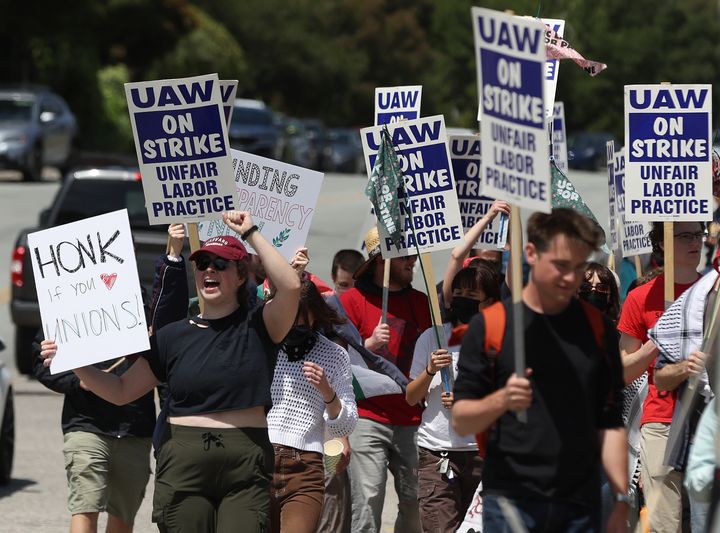The University of California has asked the state for an injunction to force striking graduate students back to work.
Hundreds of grad students at UC Santa Cruz walked off the job Monday in protest of the university system’s crackdown on pro-Palestinian demonstrations. Their union, United Auto Workers Local 4811, has warned that the walkouts could soon spread to other campuses across the state.
The university asked the state labor relations board on Tuesday to enjoin the strike, arguing that the work stoppage is illegal.
If the request succeeds, the strikers would lose legal protections should they refuse to return to work.
“UAW’s strike is unlawful because the goal is to pressure the University to concede to a list of politically motivated demands,” the university said in a statement.
“The union has warned that the walkouts could soon spread to other campuses across the state.”
The grad students have accused the university of committing unfair labor practices by bringing in police to arrest demonstrators opposed to the Israeli military campaign in Gaza. Police tore down pro-Palestinian encampments and made more than 200 arrests at UCLA and 47 at UC Irvine earlier this month.
When it filed charges against the university on May 3, the union alleged UCLA “shamefully allowed and condoned a violent attack” on demonstrators by counter-protestors. It has cast the strike as a fight over “the right to free speech and to peaceful protest without fear of intimidation and reprisal.”

Students and faculty on campuses across the country have pushed back against their schools’ crackdown on demonstrations related to Gaza. But in California, the university is facing off with an especially large and assertive union of 48,000 that isn’t new to work stoppages. Academic workers in California also hit the picket lines for six weeks in 2022 in a push for higher pay and benefits.
The legality of the current strike may hinge on whether the board believes the grad students walked out over legitimate workplace grievances, as opposed to more general political appeals. The union has argued its demands — such as the right to opt out of military-funded research and to a workplace free of discrimination toward pro-Palestinian employees— are explicitly work-related.
The university administration disagrees.
“The legality of the current strike may hinge on whether the board believes the grad students walked out over legitimate workplace grievances.”
“UAW is a labor union and its negotiations with the University must be tied to terms and conditions of employment and terms in the collective bargaining agreement,” UC said in its statement.
The agency evaluating the injunction request, the Public Employment Relations Board, couldn’t immediately be reached for comment.
The union’s president, Rafael Jaime, said in a statement that grad students were “disappointed but not surprised” that the university is trying to force them back to work by legal means. Jaime accused the university of “refusing to engage” when the state labor board tried to broker a resolution to the standoff.
“UC’s attempts to seek injunctions have been unsuccessful in the past, and we believe this attempt will ultimately be unsuccessful as well,” Jaime said. “Rather than spending time and resources on these legal maneuvers, UC should remedy their unfair labor practices.”
Disclaimer: The copyright of this article belongs to the original author. Reposting this article is solely for the purpose of information dissemination and does not constitute any investment advice. If there is any infringement, please contact us immediately. We will make corrections or deletions as necessary. Thank you.
